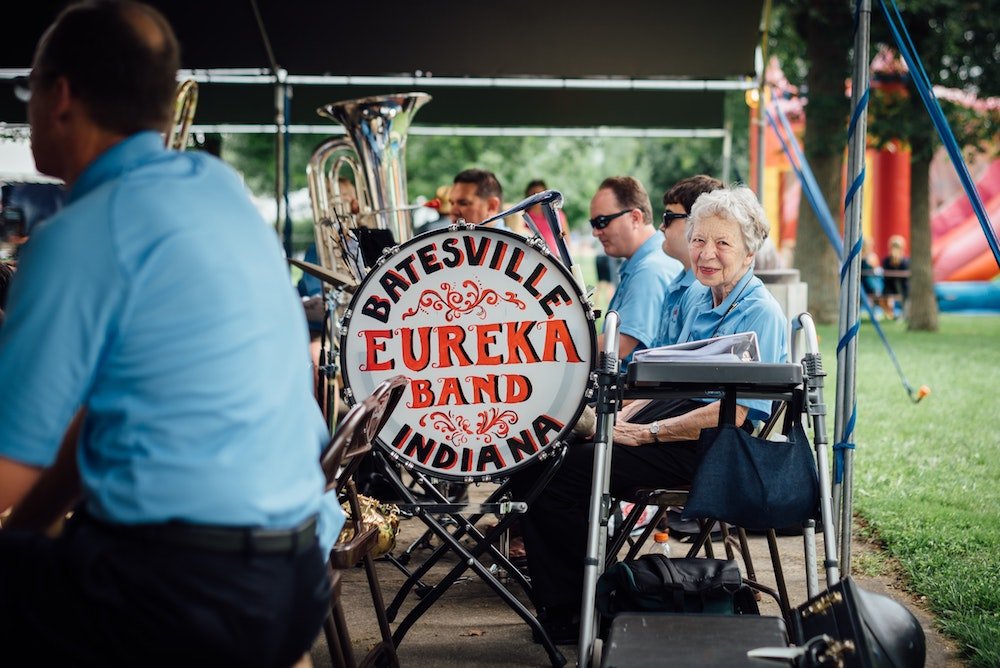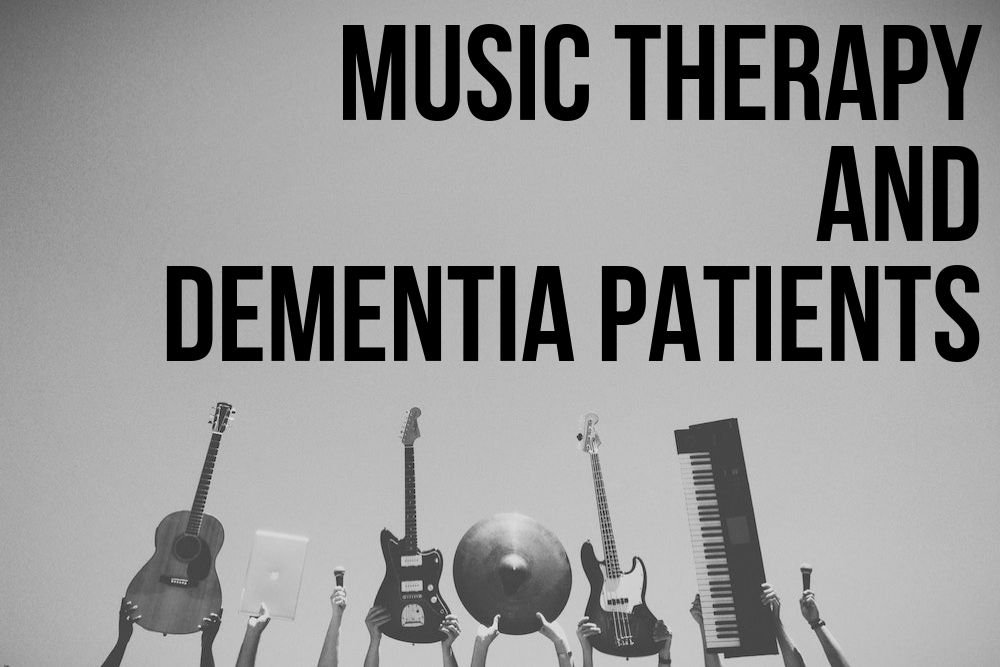After several studies and researches, we also tested it ourself and it shows that music therapy and dementia go very well together.
The number of people with dementia continues to soar. Statistics indicate that about fifty million people globally are living with dementia.
Because the illness does not have a cure yet, experts in the field and caregivers continue to explore ways and therapies to offer care and support to individuals with dementia.
One of the care methods that has PROVED to have DRAMATIC effects on people with dementia is music therapy.
This is a type of treatment that seeks to improve functioning to enhance the quality of life.
The Amazing Benefits Of Music Therapy
Over the years, there have been many scientific findings showing that music therapy comes with numerous benefits to persons with dementia.
Check out some of the ways music therapy and dementia go hand in hand to help people with the condition.
Helps Unlock Memories

Music has the power to unlock memories. Studies reveal that music has a way of reaching parts of a damaged brain that other forms of communication cannot penetrate.
Professor Paul Robertson, an academic and concert violinist, reported that humans tend to remain contactable as musical beings on a certain level up until they take their very last breath.
He explained his findings further by stating that the brain’s auditory system is usually THE FIRST to function fully at sixteen weeks, implying that a person is musically receptive first.
In this case, it is a first in, last out situation.
This is one of the reasons multiple musical organizations offer home care visits that benefit residents with dementia.
Evokes Engagement

When talking about music therapy and dementia, it is important to understand that music does not only affect you emotionally but physically as well.
Experts explain that the sounds that music therapy produces help to awaken some parts of the brain that have not been impacted by dementia.
Music EVOKES responses like movement, humming or singing, and short-term reconnection moments with loved ones.
This typically works when an individual remembers the songs they used to love when they were young.
The type of music usually has the strongest responses scoring highly in regards to recollection and engagement.
Unfamiliar music can also work well, especially when it has no negative reactions since it carries no emotions or memories.
Can Be a Welcome Distraction

Music therapy is normally beneficial in all stages of dementia from the onset of the disease all the way to the last stages.
For instance, during the middle stages, a person with dementia may experience challenges with their behaviors.
At this point, music can be a great way to distract an individual.
A caregiver or aide can sing to a person when they are feeling frustrated or uneasy and it can help calm them down.
This may also work when the individual is handling a specific job. The music can give them the MOTIVATION they need to complete the tasks at hand.
Uplifts Moods

Many are the times when persons with dementia feel low for one reason or the other. Music, for a long time, has proved to help brighten the moods of people with the illness.
Music can also help seniors to fight depression while encouraging positive interactions.
An individual may be sulking one minute, but when they listen to music, a smile may start forming on their face right away.
When you want to improve moods, it is usually best to play “stimulative music” that features quick tempos as well as percussive sounds. This kind tends to promote energy and movement naturally.
Leads to Better Health

Better health is often associated with music therapy and dementia. This kind of treatment can STIMULATE and STRUCTURE physical movement.
It is particularly helpful in those who are less likely to work out or engage in other physical activity.
It goes without saying that physical activity facilitates the health of various systems in the body including lymphatic, digestive, cardiovascular, respiratory, nervous, and skeletal/muscular among many others.
When verbal directions cannot be used to give out directions for exercise programs, music can offer the rhythm that is needed to stimulate participation.
Singing aids a person in deep breathing a prerequisite for physical relaxation.
This often precedes deep relaxation and sleep at times. Singing is enjoyable and comfortable for many.
Reduces Social Isolation

It happens commonly that music therapy professionals conduct group sessions for persons who have dementia.
This helps to reduce social isolation because it encourages golden-agers with the illness to go out there and interact with other people.
It is especially helpful for people who feel like they do not belong to any group. Thus, shy away from activities that can significantly benefit them at the end of the day.
When a person who is around others with a similar condition, they are bound to open up. This can result in making new friends and participating in fun activities that will make them happy.
Assist with Speech

Many experts agree that music therapy plays a crucial role in helping persons with dementia to communicate effectively. Persons who work with therapists have been known to speak clearer and even make better decisions.
When a person listens to music, they can pick up some words they know to help them construct sensible sentences to hold a conversation with another person without too much difficulty.
The therapy can even help SLOW DOWN sleep deterioration and language skills in individuals with dementia.
Some studies show that even though a person with this disease loses the ability to speak, most of the time, they can still recognize, or also sing or hum their favorite tunes.
Can Be Part of a Holistic Treatment Approach

Experts who deal with music therapy and dementia can combine the therapy with other therapeutical activities to come up with a holistic treatment approach to dementia.
Professional therapists can guide senior citizens with dementia as they participate in other activities such as games, creating art, cooking, crafts, and gardening, etc.
The experts should ensure that seniors with the medical condition always have a relaxed environment. A location where they can have fun without any stringent schedules to adhere to.
Even in the later stages, music therapy can also be used to offer a sense of better control over life.
It helps coordinate motor movements and aid in enhanced brain function.
Reduce Anxiety and Stress

Music therapy offers persons with dementia an avenue to get other people to listen to them and communicate experiences to find ways of distressing.
Participating in this type of treatment brings about positive influences in various areas of a person’s life.
This includes hope, communication skills, optimism, and well-being.
Many individuals with the illness also record increases in perceived happiness, enjoyment, enhanced mental health, and improved quality of life.
Additionally, structured therapy improves the potential for positive experiences leading to a positive impact on factors like self-efficacy and esteem.
This is important because it makes a person feel worthy again to live their lives to the fullest despite what they are going through.
Boosts Good Feelings and Ideas

Let’s face it, when listening to music, it is ALMOST IMPOSSIBLE to feel down. Sure, we need to focus on listening to the music that cheers us up and makes us feel good.
Why would you even want to listen to the tunes that make you feel sad and lonely?
Of course, music therapy is a FANTASTIC approach that will boost good feelings and great ideas in a person with dementia. It is a simple technique that almost always does the trick.
You can practice it immediately, especially if you have their favorite artist at hand. Raise the good vibes and let everyone in the room feel good by tuning in some good songs.
Manages Sleep Disorders

It is not uncommon for persons with dementia to experience troubles when it comes to sleep patterns.
Music therapy can assist such individuals to have longer hours of deep sleep. This is a great move for the health of an individual.
After all, getting enough rest and sleep is another way of reducing stress, anxiety, and agitation.
In regards to sleep, some people who have dementia will sleep better when they listen to some soothing tunes before they retire to bed.
Listening to such music helps to calm the soul so that an individual is not overthinking. Meaning, they can sleep peacefully for longer hours.
Some experts advise that listening to music before sleeping helps with insomnia, too.
Improves Motor-Functioning

Enhanced motor functioning is another area where individuals with dementia can benefit when they start music therapy.
When good music is playing, there is a high chance that the person listening will want to move about and dance.
Even when a person cannot stand up, they will probably move their arms and legs promoting coordination.
Tapping and clapping is another response to music that can help introduce feel-good hormones and get the blood flowing right.
A person can also improve their motor skills when they are playing an instrument. It can lead to more independence, especially if an individual is not yet in the last stages of the disease.
Music Therapy and Dementia Closing Remarks

The Alzheimer’s Association confirms that music therapy helps to add something fundamental to the lives of individuals with dementia-related illnesses.
This is why it is important to learn about music therapy and dementia. To some extent, it would be safe to say that music is therapeutic.
It offers individuals with the illness a chance not only to express themselves but also to engage with others.
Note that the simple act of playing music is not considered music therapy. Only credentialed experts can provide musical treatment so that it can bring out the desired effects in persons with dementia.
You must, therefore, DO ENOUGH RESEARCH when looking for a professional therapist to ensure that the individual with dementia remains in good hands.

